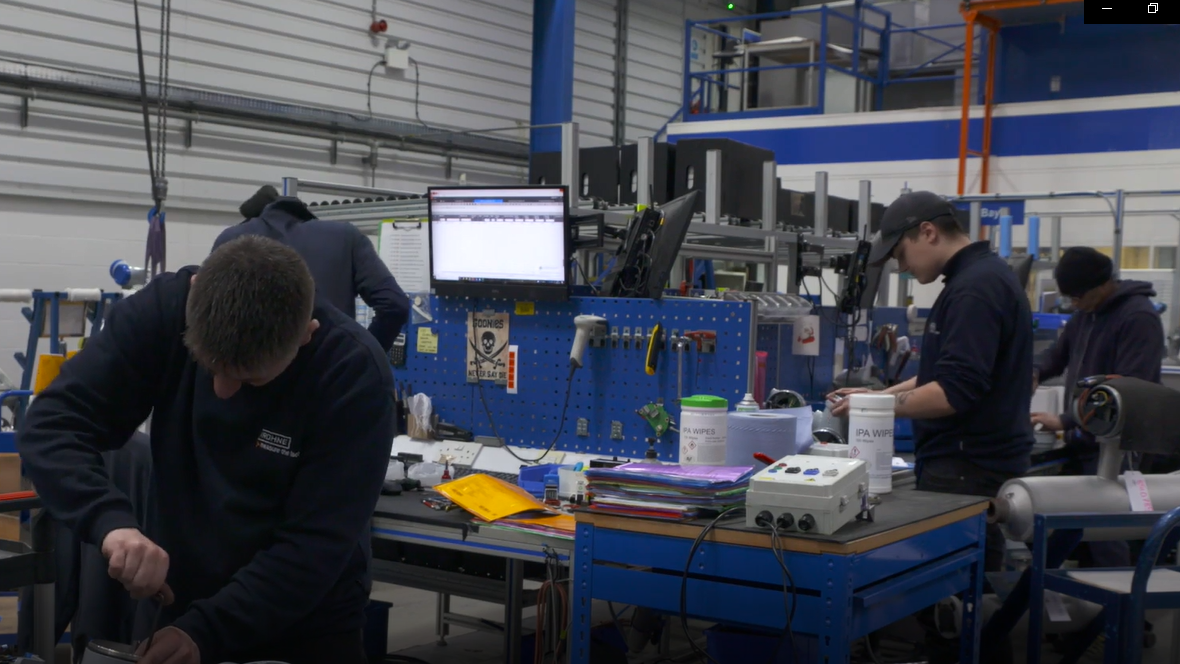“We’re much stronger now technically as a consequence of the KTPs and that’s given us an edge because we can get products to market much quicker. We have much more detailed technical knowledge. And we’ve grown – from an SME to more than 300 employees.”
Edward Jukes, General Manager and Technical Director for KROHNE UK
The Challenge
Through KTPs, businesses receive significant funding to work with our academics on a strategic project to deliver growth. KROHNE is a manufacturer of process instrumentation, measurement solutions and services for a range of industries, from food and beverage through to oil and gas.
For its latest KTP, the business wanted to develop an advanced flow converter for Coriolis mass flowmeters. This type of flowmeter is primarily used to measure the mass flow rate of liquids in industrial settings. A ‘flow converter’ is the electronics and software used to convert the raw signals from the flow sensor to a meaningful value.
Whilst KROHNE had some of the knowledge to develop the new product within their German parent company, it was important for them to have significantly more capability in-house. Doing this would remove the ‘knowledge barrier’ between the two parts of the system – the flowmeter and flow converter – and optimise both rather than considering them as individual black boxes.
A KTP allows businesses to access academics’ knowledge and expertise, quickly expanding on their in-house capability. As KTPs are funded by the government, this was a much more cost-effective option for KROHNE than in-house development.
Choosing the University of Kent
KROHNE’s UK location near Northampton is some 140 miles away from the University of Kent’s Canterbury location. Despite other, much nearer, universities offering KTPs, KROHNE chose Kent because of their positive and proactive approach to industrial collaboration projects – with a particular appreciation for getting ideas to market.
KROHNE has now worked with the University of Kent on several projects. Originally, they collaborated on research projects that led to the business learning about Kent’s KTP capability. KTPs appealed to KROHNE due to the closer working structure with supervisors in both the company and university.
This latest KTP is KROHNE’s third with the University of Kent. Unlike most universities, the University of Kent has a 100% success rate in securing KTP funding.
The Approach
Initially, the University of Kent supported KROHNE to submit the KTP application. The university’s extensive experience of successfully applying for this funding, reduces the time and admin burden on businesses like KROHNE.
KTPs allow businesses to access matched funding, which ensures more value for money on R&D spend and a greater return on investment.
The KTP established Prof Yong Yan as the lead academic, representing the School of Engineering within the Division of Computing, Engineering and Mathematical Sciences. Prof Yan was chosen for his specialist experience in flow measurement and instrumentation.
As part of the KTP, the University of Kent hired a proactive Associate with skills that are tailored to the business needs and goals, and this involved a collaborative interview process with KROHNE. Now fully onboarded, the Associate is acting as the knowledge conduit between the company and the university whilst being based in-house at KROHNE. The theoretical knowledge that Kent is transferring to the business for this KTP is in the field of Digital Signal Processing.
The Results
When KROHNE started their first KTP, they were an SME. Their KTPs have collectively provided them with a huge opportunity to grow, especially through investing in their own research team. The business is now a medium-sized company employing nearly 300 people. KTPs help businesses to access cutting-edge academic research to give them a competitive industry advantage by increasing productivity and profitability.
The broad range of research that the University of Kent offers was a vast improvement on what was originally available in-house at KROHNE. So far, the company has benefited from academic research and resources to uncover innovative ideas for advanced flowmeters and transfer it into their business in a cost-efficient way.
The current KTP is scheduled to run until mid-2024 and if it works out as well as the business’ previous KTPs, it is hoped that the Associate will end up as an employee. Previous Associates have subsequently been employed by KROHNE and have made significant contributions to the business. KTPs are a low-risk way for businesses to hire competent and valuable, tried-and-tested new employees that already work well with their team.
KTPs brings together businesses and academics from across the University of Kent’s KTP programme, helping them to form connections and build long-term relationships that yield sustainable business growth.
 Knowledge Transfer Partnerships, funded by Innovate UK, aim to help businesses to improve their competitiveness and productivity through the better use of knowledge, technology and skills that reside within the UK knowledge base. With over 36 years of experience in delivering KTPs and a 100% application success rate in the past 7 years, the University of Kent is perfectly-positioned to help your business tap into this fantastic opportunity to innovate and grow. If you are interested in finding out about KTPs, watch our KTP Officer Clare Witcher talking about KTP projects on our YouTube channel, and contact the team to arrange a one-to-one.
Knowledge Transfer Partnerships, funded by Innovate UK, aim to help businesses to improve their competitiveness and productivity through the better use of knowledge, technology and skills that reside within the UK knowledge base. With over 36 years of experience in delivering KTPs and a 100% application success rate in the past 7 years, the University of Kent is perfectly-positioned to help your business tap into this fantastic opportunity to innovate and grow. If you are interested in finding out about KTPs, watch our KTP Officer Clare Witcher talking about KTP projects on our YouTube channel, and contact the team to arrange a one-to-one.

